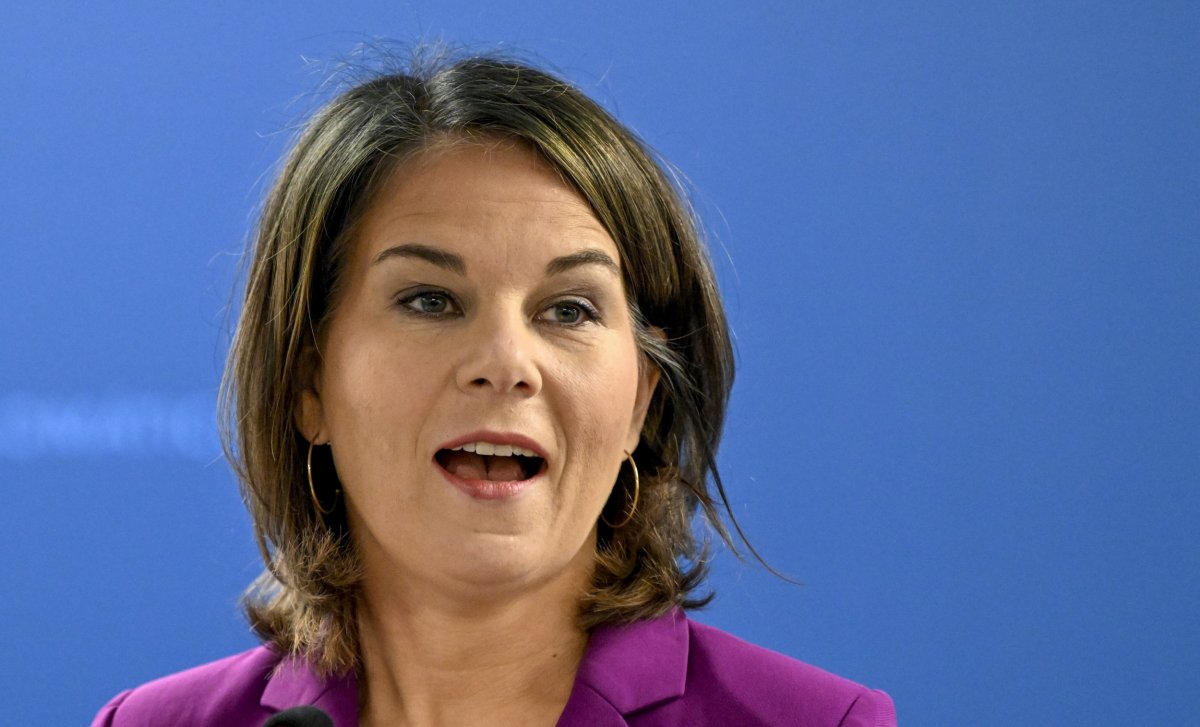German Foreign Minister Annalena Baerbock isn't bashful about laying blame on Russia as its war in Ukraine surpasses 11 months.
Baerbock used a significant portion of her keynote address Tuesday at the Parliamentary Assembly of the Council of Europe in Strasbourg, France, to defend law, democracy and human rights in response to "Russia's murderous attack on the people of Ukraine."
"We are fighting a war against Russia and not against each other," Baerbock said, according to the A News TV network.
Baerbock called for unity among Western allies following the announcement that Berlin would send Leopard 2 tanks to Ukraine. Former U.S. military officials have expressed varied opinions about whether the tanks will lead to major change in the ground war.
I strongly welcome the leadership of @Bundeskanzler & #Germany in providing #Leopard2 tanks to #Ukraine in consultation with other #NATO Allies & partners. At a critical moment in Russia’s war, these can help Ukraine to defend itself, win & prevail as an independent nation.
— Jens Stoltenberg (@jensstoltenberg) January 25, 2023
NATO Secretary General Jens Stoltenberg met with German Defense Minister Boris Pistorius on Tuesday in Berlin, expressing appreciation for Germany offering among the most military, financial and humanitarian aid to Ukraine during the war.
Stoltenberg said air defense systems, armored vehicles, artillery and ammunition are "weapons from Germany [that] are saving lives in Ukraine every day."
"At this pivotal moment in the war, we must provide heavier and more advanced systems to Ukraine—and we must do it faster," Stoltenberg said.

While adding that Germany can and should do more to defend Ukraine, Baerbock stressed that unity remains the most "crucial part" in overcoming Russian aggression.
"Russia's war of aggression is not only a war against Ukraine, it is a war against the common European peace order....You have shown [Russian President Vladimir] Putin that he would never succeed in destroying Ukraine, but that he would also never succeed in destroying our common home of peace, the Council of Europe," she said during her approximate 33-minute address.
Baerbock spoke of visiting the Ukrainian city of Kharkiv and meeting young citizens in continual distress.
She also said that due to the Council of Europe being more important than ever, as a place where nations can come together and exchange ideas, it "must be resolute now more than ever" as an entity Putin wants to destroy.
"President Putin wants to drag Europe back into a past dominated by power politics where states can trample on...rights in the pursuit of imperial glory; where rulers dispose of their citizens like pawns in geopolitical chess games," she said.
"That is why in the face of Russia's war, neutrality was not an option. We had to make a choice between injustice and justice, freedom and oppression, between standing on the side of the aggressor, and standing on the side of the victims."
Hilary Appel, government professor at Claremont McKenna College in Claremont, California, told Newsweek that Baerbock "misspoke" [when she said, "We are fighting a war against Russia] but described it as "a fascinating and important mistake that serves Russia's interests" because of its continuous attempts to portray that its overarching war is against NATO, not just Ukraine.
"Russia prefers to characterize this as a proxy war to justify its actions and to account for its poor performance on the battlefield," Appel said. "By contrast, the U.S. and its NATO allies characterize this as a war between Russia and Ukraine, in which the West is supporting Ukraine's defense against an unprovoked invasion.
"Thus, NATO is not at war against Russia and NATO countries explicitly oppose any incursion into Russian territory using the weapons it supplied. Moreover, NATO's support of Ukraine's self-defense has limited the types of weapons provided thus far. The very recent decision to supply Ukraine with tanks may undermine the consistency of the approach, however."
Mikhail Troitskiy, professor of practice at the University of Wisconsin-Madison, said that Baerbock's use of the term "war" was likely more figurative than literal, shaped by the emotional atmosphere at the Council of Europe.
"It was not a declaration of war or a signal of a radical departure from a more bland position—expressed, for example, by NATO officials who would say that NATO supports Ukraine but stops short of fighting against Russia," Troitskiy told Newsweek.
"So, while manifesting a break with the earlier bland official rhetoric, the statement about a 'war with Russia' is not a very big deal. The decision to supply tanks and other powerful weapons to Ukraine potentially is."
On Wednesday, President Joe Biden announced that the U.S. would send 31 Abrams tanks to Ukraine.
Newsweek reached out to NATO for comment.
Uncommon Knowledge
Newsweek is committed to challenging conventional wisdom and finding connections in the search for common ground.
Newsweek is committed to challenging conventional wisdom and finding connections in the search for common ground.
About the writer
Nick Mordowanec is a Newsweek reporter based in Michigan. His focus is reporting on Ukraine and Russia, along with social ... Read more
To read how Newsweek uses AI as a newsroom tool, Click here.








